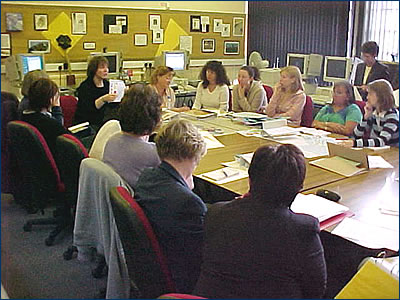
What is KidSmart?
Background to the Project
There has been a wealth of research in recent years into the current provision, benefits and potential dangers of using ICT in Early Years settings. It is widely accepted that appropriate use of ICT in settings, where there are skilled practitioners and quality ICT resources, has the potential to greatly enhance and support learning and development of young children.
Our involvement, as authorities in the Kidsmart Program over the past two years, has enabled us to focus on the quality of provision offered in our schools and devise a programme which highlights and develops the use of ICT as an effective tool for learning in Early Years education. Since September 2001, 12 settings in Swansea and 14 settings in Neath Port Talbot have received the “Little Tikes” computers and undertaken the training.
Kidsmart is an international initiative led by IBM in partnership with BAECE (British Association for Early Childhood Education), DATEC (Developmentally Appropriate Technology for Early Childhood) and the Universities of London and Cambridge. It is currently operating in 11 countries and is led in this country by John Siraj-Blatchford (Cambridge) and Iram Siraj-Blatchford (Institute of Education, London).
It is a corporate philanthropy initiative which donates specially designed child friendly computers to Early Years settings in areas of deprivation in an attempt to bridge the “digital divide”. The focus of the project is to reach common agreement on what constitutes a developmentally appropriate ICT curriculum for Early Years education.
All organisations involved are encouraged to cascade the Kidsmart training programme offered through Cambridge University to practitioners and develop this further by offering a training programme that promotes exemplar practice
Supporting Practitioners: Training and Resources
The use of ICT in Swansea and Neath and Port Talbot schools has been established for many years. However, Early Years teachers have received limited training specific to their age group and, as a general rule, have the oldest equipment. Therefore, a training programme was devised which focused on developing pedagogy and practice in the use of ICT across all Desirable Outcomes Areas of Learning.

The aims of the programme were to:
- Adopt a wide ranging definition of what is meant by ICT, thus stressing the technology which surrounds children in their every day lives and not just computers.
- Explore the potential for children to learn with, through and about ICT.
- Underline the importance of play and exploration. An emphasis was placed on the need for direct teaching of ICT skills. Children need to be taught how to use ICT applications and encouraged to explore their potential and develop their skills and understanding through the provision of meaningful, enjoyable, stimulating, active play experiences.
- Promote planned, developmentally appropriate ICT activities and experiences through the curriculum.
- Underline the role of observing, assessing and recording children’s use of ICT in order to help them develop and make progress.
- Develop critical awareness of the potential of hardware/software.
- Promote effective classroom organisation and deployment of staff with the emphasis on sensitive interaction and questioning.
- Develop policy and curriculum guidance with advice on appropriate ICT resources which would be made available to practitioners and parents.
In order to develop pedagogy and practice it was decided that input would be necessary from Early Years and ICT advisers. The training model devised focused on the practitioner as the learner, starting as we do with children, with what they already knew and understood. Practitioners were asked to complete a questionnaire to identify previous training received and ICT hardware/software and resources available. This enabled us to create a programme based on identified needs.
Please download the following informative resources which support the KidSmart project:
| Appropriate ICT in Early Childhood PowerPoint Presentation (1.01 Mb) |
|
| A Multimedia Guide to Computers and Early Learning Shockwave Movie (18.5 Mb) |








